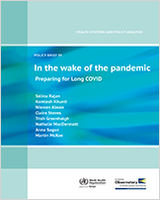NCBI Bookshelf. A service of the National Library of Medicine, National Institutes of Health.
Key messages
- COVID-19 can cause persistent ill-health. Around a quarter of people who have had the virus experience symptoms that continue for at least a month but one in 10 are still unwell after 12 weeks. This has been described by patient groups as “Long COVID”.
- Our understanding of how to diagnose and manage Long COVID is still evolving but the condition can be very debilitating. It is associated with a range of overlapping symptoms including generalized chest and muscle pain, fatigue, shortness of breath, and cognitive dysfunction, and the mechanisms involved affect multiple system and include persisting inflammation, thrombosis, and autoimmunity. It can affect anyone, but women and health care workers seem to be at greater risk.
- Long COVID has a serious impact on people’s ability to go back to work or have a social life. It affects their mental health and may have significant economic consequences for them, their families and for society.
- Policy responses need to take account of the complexity of Long COVID and how what is known about it is evolving rapidly. Areas to address include:
- –
The need for multidisciplinary, multispecialty approaches to assessment and management;
- –
Development, in association with patients and their families, of new care pathways and contextually appropriate guidelines for health professionals, especially in primary care to enable case management to be tailored to the manifestations of disease and involvement of different organ systems;
- –
The creation of appropriate services, including rehabilitation and online support tools;
- –
Action to tackle the wider consequences of Long COVID, including attention to employment rights, sick pay policies, and access to benefit and disability benefit packages;
- –
Involving patients both to foster self-care and self-help and in shaping awareness of Long COVID and the service (and research) needs it generates; and
- –
Implementing well-functioning patient registers and other surveillance systems; creating cohorts of patients; and following up those affected as a means to support the research which is so critical to understanding and treating Long COVID.
Contents
About the Series
Funding:
KK is supported by the National Institute for Health Research (NIHR) Applied Research Collaboration East Midlands (ARC EM) and the NIHR Leicester Biomedical Research Centre (BRC) in the United Kingdom.
Declarations of interest:
KK is Chair of the Ethnicity Subgroup of SAGE; KK and MM are members of Independent SAGE, all in the UK.
Address requests about publications of the WHO Regional Office for Europe to:
Publications
WHO Regional Office for Europe
UN City, Marmorvej 51
DK-2100 Copenhagen Ø, Denmark
Alternatively, complete an online request form for documentation, health information, or for permission to quote or translate, on the Regional Office web site (http://www.euro.who.int/pubrequest).
All rights reserved. The Regional Office for Europe of the World Health Organization welcomes requests for permission to reproduce or translate its publications, in part or in full.
The designations employed and the presentation of the material in this publication do not imply the expression of any opinion whatsoever on the part of the World Health Organization concerning the legal status of any country, territory, city or area or of its authorities, or concerning the delimitation of its frontiers or boundaries.
The mention of specific companies or of certain manufacturers’ products does not imply that they are endorsed or recommended by the World Health Organization in preference to others of a similar nature that are not mentioned. Errors and omissions excepted, the names of proprietary products are distinguished by initial capital letters.
All reasonable precautions have been taken by the World Health Organization to verify the information contained in this publication. However, the published material is being distributed without warranty of any kind, either express or implied. The responsibility for the interpretation and use of the material lies with the reader. In no event shall the World Health Organization be liable for damages arising from its use. The views expressed by authors, editors, or expert groups do not necessarily represent the decisions or the stated policy of the World Health Organization.
This policy brief is one of a new series to meet the needs of policy-makers and health system managers. The aim is to develop key messages to support evidence-informed policy-making and the editors will continue to strengthen the series by working with authors to improve the consideration given to policy options and implementation.
Box
What is a Policy Brief?
- NLM CatalogRelated NLM Catalog Entries
- Right care, first time: a highly personalised and measurement-based care model to manage youth mental health.[Med J Aust. 2019]Right care, first time: a highly personalised and measurement-based care model to manage youth mental health.Hickie IB, Scott EM, Cross SP, Iorfino F, Davenport TA, Guastella AJ, Naismith SL, Carpenter JS, Rohleder C, Crouse JJ, et al. Med J Aust. 2019 Nov; 211 Suppl 9:S3-S46.
- Critical Care Network in the State of Qatar.[Qatar Med J. 2019]Critical Care Network in the State of Qatar.Hijjeh M, Al Shaikh L, Alinier G, Selwood D, Malmstrom F, Hassan IF. Qatar Med J. 2019; 2019(2):2. Epub 2019 Nov 7.
- Family pediatrics: report of the Task Force on the Family.[Pediatrics. 2003]Family pediatrics: report of the Task Force on the Family.Schor EL, American Academy of Pediatrics Task Force on the Family. Pediatrics. 2003 Jun; 111(6 Pt 2):1541-71.
- Review Tuberculosis.[Major Infectious Diseases. 2017]Review Tuberculosis.Bloom BR, Atun R, Cohen T, Dye C, Fraser H, Gomez GB, Knight G, Murray M, Nardell E, Rubin E, et al. Major Infectious Diseases. 2017 Nov 3
- Review Technology and the environment: supportive resource or barrier for people with developmental disabilities?[Nurs Clin North Am. 2003]Review Technology and the environment: supportive resource or barrier for people with developmental disabilities?Hammel J. Nurs Clin North Am. 2003 Jun; 38(2):331-49.
- In the wake of the pandemicIn the wake of the pandemic
Your browsing activity is empty.
Activity recording is turned off.
See more...
